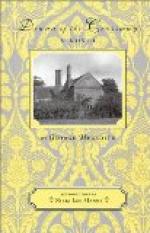Dacier sat in an open carriage, facing a slip of bright moon. Poetical impressions, emotions, any stirrings of his mind by the sensational stamp on it, were new to him, and while he swam in them, both lulled and pricked by his novel accessibility to nature’s lyrical touch, he asked himself whether, if he were near the throes of death, the thought of having Diana Warwick to sit beside his vacant semblance for an hour at night would be comforting. And why had his uncle specified an hour of the night? It was a sentiment, like the request: curious in a man so little sentimental. Yonder crescent running the shadowy round of the hoop roused comparisons. Would one really wish to have her beside one in death? In life—ah! But suppose her denied to us in life. Then the desire for her companionship appears passingly comprehensible. Enter into the sentiment, you see that the hour of darkness is naturally chosen. And would even a grand old Pagan crave the presence beside his dead body for an hour of the night of a woman he did not esteem? Dacier answered no. The negative was not echoed in his mind. He repeated it, and to the same deadness.
He became aware that he had spoken for himself, and he had a fit of sourness. For who can say he is not a fool before he has been tried by a woman! Dacier’s wretched tendency under vexation to conceive grotesque analogies, anti-poetic, not to say cockney similes, which had slightly chilled Diana at Rovio, set him looking at yonder crescent with the hoop, as at the shape of a white cat climbing a wheel. Men of the northern blood will sometimes lend their assent to poetical images, even to those that do not stun the mind lie bludgeons and imperatively, by much repetition, command their assent; and it is for a solid exchange and interest in usury with soft poetical creatures when they are so condescending; but they are seized by the grotesque. In spite of efforts to efface or supplant it, he saw the white cat, nothing else, even to thinking that she had jumped cleverly to catch the wheel. He was a true descendant of practical hard-grained fighting Northerners, of gnarled dwarf imaginations, chivalrous though they were, and heroes to have serviceable and valiant gentlemen for issue. Without at all tracing back to its origin his detestable image of the white cat on the dead circle, he kicked at the links between his uncle and Diana Warwick, whatever they had been; particularly at the present revival of them. Old Lady Dacier’s blunt speech, and his father’s fixed opinion, hissed in his head.
They were ignorant of his autumnal visit to the Italian Lakes, after the winter’s Nile-boat expedition; and also of the degree of his recent intimacy with Mrs. Warwick; or else, as he knew, he would have heard more hissing things. Her patronage of Miss Paynham exposed her to attacks where she was deemed vulnerable; Lady Dacier muttered old saws as to the flocking of birds; he did not accurately understand it, thought




